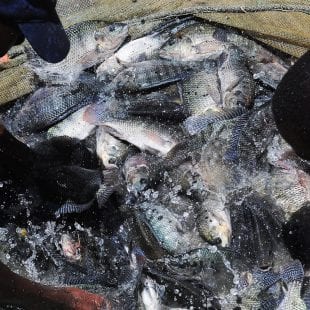Tanzanian aquaculture sector offers opportunities for Dutch public and private sector
Download: Tanzania Aquaculture Report | FoodTechAfrica 2019
The Netherlands embassy in Tanzania has commissioned an aquaculture report to identify the key development opportunities for Tanzania’s aquaculture sector and the potential for Dutch public and private sector involvement in addressing these opportunities. The study suggests an integrated Dutch-Tanzanian public and private sector approach based upon the identified needs of Tanzanian stakeholders, the commercial opportunities fitting with the nascent character of the sector.
Vast market potential for locally farmed fish
Tanzania offers attractive potential for aquaculture; its climate is ideal for farming indigenous fish species including tilapia and African catfish. These are the favored species of Tanzania’s lower- and middle-income classes. Market demand for fish is growing rapidly due to factors including population growth and rising incomes. However, supply from wild catch is dwindling as natural water bodies are overfished and in general unregulated. This results in an estimated fish demand deficit of a staggering 480,000 tons per annum, which offers an attractive opportunity for those looking to establish local fish farming for the local market.
Local production
Today, aquaculture in Tanzania is mostly a small-scale activity and usually not practiced as a stand-alone economic activity, but rather as subsistence farming integrated with other agricultural activities. Together, Tanzanian farmers produced around 3,240 tons of fish in 2014, growing from 1,522 tons in 2007, representing a small but growing sector. The Tanzanian government actively supports sector growth by implementing a dedicated aquaculture development policy focused on commercial fish farming for both export and the domestic market. Despite its potential and widely recognized importance, there are several opportunities to further boost the development of the sector.
Opportunities for Dutch public and private sector involvement
The Tanzanian aquaculture sector offers several areas of opportunities for investment and support by Dutch public and private sector stakeholders:
- Improvement of practical and market-oriented capacity among both educational (training) institutes and private sector operational staff.
- Improvement of aquaculture inputs accessibility and affordability through improved control over fish gene pool, professionalisation of hatcheries and conducive feed import regime.
- Upgrading of farming technologies through introduction of more knowledge and capital-intensive production systems and improved farm record keeping.
- Improvement of market access for fish farmers by improved market differentiation of farmed fish, processing and consistent and increased supply to markets.
- Enabling access to finance by development of aquaculture business cases and business planning skills.
- The regulatory framework offers room for improvement with regards to import regulation, simplification of licencing and permits for farmers and investors, zoning of cage farm activity and VAT regimes for feeds.
Dutch public private approach
Improving Tanzania’s aquaculture sector requires a holistic approach focused on increase in domestic productivity in an environmentally friendly and socially responsible way. This can be realized through the introduction of more knowledge and capital-intensive production systems adapted towards local circumstances, in direct combination with selective (vocational) training and technical advice. The enabling environment can be upgraded by providing a conducive regulatory framework, market oriented educational institutes and an established private sector organization. The recommended public-private approach has proven very successful in other aquaculture development programs in East Africa, such as FoodTechAfrica.
About the Aquaculture Impact Cluster
In 2013, a group of Dutch private and public sector organisations saw the potential for aquaculture in east Africa and they formed the FoodTechAfrica partnership. Along the value chain, investments were needed to unlock the sector’s potential. FoodTechAfrica partners established the first quality aquafeed factory in East Africa, the first recirculation aquaculture farms, and rolled out a comprehensive aquaculture training program. After the successes in Kenya, it was decided to expand and invest in Tanzania, which also has a great potential for fish-farming. In Tanzania, the consortium of companies started in a public-private partnership together with the Embassy of the Netherlands in the beginning of 2019. This partnership is called the ‘Aquaculture Impact Cluster.’ Currently, the consortium is developing a demo-farm in Kigamboni, Dar es Salaam based upon the Recirculation Aquaculture System (RAS).
Interested to learn more? Follow activities of the impact cluster on FoodTechAfrica’s website or contact Menno Morenc or Theonestina Mutabingwa of the Embassy of the Kingdom of the Netherlands.
Download: Tanzania Aquaculture Report | FoodTechAfrica 2019
More about the Impact cluster: Agroberichtenbuitenland.nl




